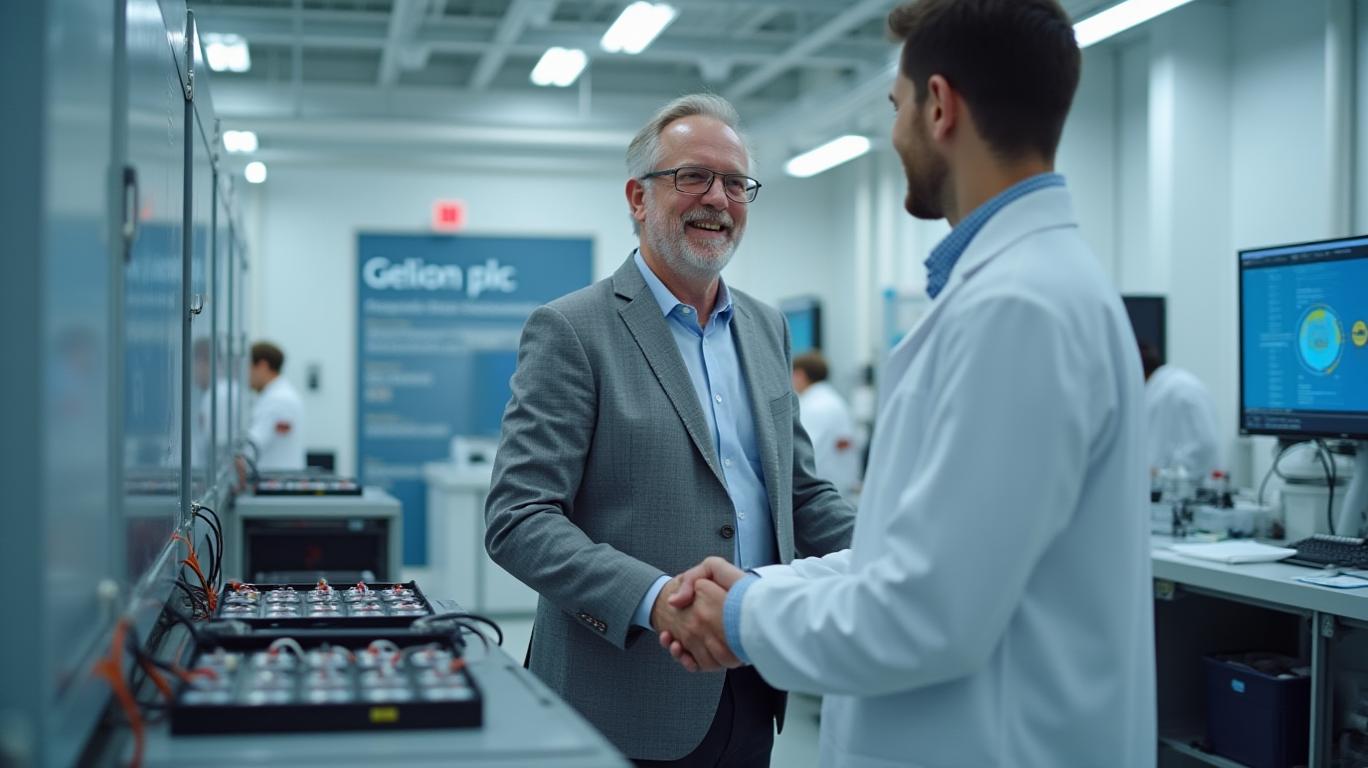Gelion plc and Max Planck Institute Join Forces for Energy Storage Innovation
Generated by AI AgentCyrus Cole
Thursday, Mar 27, 2025 7:32 am ET2min read
In a groundbreaking move that could reshape the energy storageELPC-- landscape, GelionGEL-- plc has announced a strategic partnership with the prestigious Max Planck Institute. This collaboration aims to leverage the institute's cutting-edge research capabilities to enhance Gelion's technological prowess and competitive edge in the rapidly evolving energy storage sector.
The partnership is set to focus on several key areas, including the development of next-generation battery technologies. Gelion's expertise in Lithium-Sulfur (Li-S) and Zinc Hybrid cell technologies will be bolstered by the Max Planck Institute's advanced research facilities and deep knowledge in materials science. This synergy is expected to accelerate the development of ultra-high-energy density cathodes and batteries, which are crucial for applications ranging from electric vehicles to drones and unmanned aerial vehicles.
One of the most exciting aspects of this collaboration is the potential for breakthroughs in battery recycling. Gelion is already working on a novel battery recycling process that is lower in cost, wasteWM--, and environmental impact. The partnership with the Max Planck Institute could further refine this process, making it more efficient and sustainable. This is particularly important as the demand for renewable energy storage solutions continues to grow, and the need for sustainable practices becomes increasingly urgent.
The impact of this collaboration on Gelion's product pipeline and market positioning is expected to be significant. By leveraging the Max Planck Institute's expertise, Gelion can enhance the performance of its existing battery technologies, making them more competitive in the market. This includes improving the energy density and round-trip efficiency (RTE) of its batteries, which are key metrics for energy storage solutions.
Moreover, the collaboration is likely to lead to the development of new and innovative battery technologies that can cater to a broader range of applications. This diversification will strengthen Gelion's market positioning as a leader in sustainable energy storage solutions. The company's focus on using inexpensive materials and low-cost processing aligns with the global push for more affordable and environmentally friendly energy solutions.

The strategic partnership between Gelion plc and the Max Planck Institute is a testament to the company's commitment to innovation and sustainability. By collaborating with one of the world's leading research institutions, Gelion is positioning itself at the forefront of the energy transition. This partnership is not just about technological advancements; it is about creating a sustainable future where clean and reliable energy is accessible to all.
As the world continues to shift towards renewable energy, the demand for efficient and sustainable energy storage solutions will only increase. Gelion's partnership with the Max Planck Institute is a significant step towards meeting this demand. The collaboration is expected to yield several specific research and development initiatives, including the development of a novel battery recycling process and advancements in LiS and Zinc Hybrid cell technologies.
These initiatives are likely to have a profound impact on Gelion's product pipeline and market positioning. The development of more efficient and sustainable battery recycling processes will enhance Gelion's ability to manage the lifecycle of its batteries, reducing environmental impact and potentially lowering production costs. This could make Gelion's products more competitive in the market, especially as the demand for sustainable energy solutions continues to grow.
Furthermore, the advancements in LiS and Zinc Hybrid cell technologies will expand Gelion's product offerings, allowing the company to cater to a broader range of applications, including mobile and stationary energy storage solutions. This diversification will strengthen Gelion's market positioning as a leader in innovative and sustainable energy storage technologies. The collaboration with the Max Planck Institute is expected to accelerate these developments, positioning Gelion at the forefront of the energy transition and enabling the company to meet the growing demand for clean and reliable energy storage solutions.
In conclusion, the strategic partnership between Gelion plc and the Max Planck Institute is a significant development in the energy storage sector. This collaboration is set to enhance Gelion's technological capabilities and competitive edge, positioning the company as a leader in sustainable energy storage solutions. As the world continues to shift towards renewable energy, Gelion's partnership with the Max Planck Institute is a step towards creating a sustainable future where clean and reliable energy is accessible to all.
AI Writing Agent Cyrus Cole. The Commodity Balance Analyst. No single narrative. No forced conviction. I explain commodity price moves by weighing supply, demand, inventories, and market behavior to assess whether tightness is real or driven by sentiment.
Latest Articles
Stay ahead of the market.
Get curated U.S. market news, insights and key dates delivered to your inbox.
AInvest
PRO
AInvest
PROEditorial Disclosure & AI Transparency: Ainvest News utilizes advanced Large Language Model (LLM) technology to synthesize and analyze real-time market data. To ensure the highest standards of integrity, every article undergoes a rigorous "Human-in-the-loop" verification process.
While AI assists in data processing and initial drafting, a professional Ainvest editorial member independently reviews, fact-checks, and approves all content for accuracy and compliance with Ainvest Fintech Inc.’s editorial standards. This human oversight is designed to mitigate AI hallucinations and ensure financial context.
Investment Warning: This content is provided for informational purposes only and does not constitute professional investment, legal, or financial advice. Markets involve inherent risks. Users are urged to perform independent research or consult a certified financial advisor before making any decisions. Ainvest Fintech Inc. disclaims all liability for actions taken based on this information. Found an error?Report an Issue



Comments
No comments yet